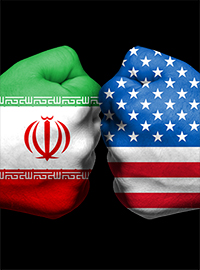| Iran's Options in Showdown With America Are All Bad |
 |
|
By Victor Davis Hanson
Thursday, January 09 2020 |
After losing its top strategist, military commander and arch-terrorist, Qassem Suleimani, the Iranian theocracy is weighing responses. One, Iran can quiet down and cease military provocations. After attacking tankers off its coast, destroying an oil refinery in Saudi Arabia, shooting down a U.S. drone and being responsible for the killing and wounding of Americans in Iraq, Iran could now keep quiet. It might accept that its strategy of escalation has failed to lead to any quantifiable advantage. Trump did not prove a passive "Twitter tiger," as his critics mocked. Instead, he upped the stakes to Iran's disadvantage and existential danger. The chances, however, for such a logical and passive readjustment by Iran are nil. Iran believes that Trump's beefed-up sanctions have all but destroyed its economy and could now extend to secondary boycotts of nations trading with Iran. U.S. sanctions have also squeezed Iranian expeditionary efforts to forge a permanent hegemony and a Shiite crescent extending to the Mediterranean. If unchecked, American economic pressure could eventually lead to a popular rebellion that would topple the theocracy. In sum, a return to the status quo is unlikely. Two, Iran can agree to re-enter talks about its nuclear program and offer a few concessions. Iran could concede that the prior agreement was designed to bank Iranian cash and nuclear expertise that would eventually lead to the country developing nuclear weaponry after a period of feigned good behavior. Yet a return to direct negotiations with Washington is also unlikely, especially since Iran once enjoyed a lopsided gift from the United States. Renegotiating anything less would be too humiliating for the revolutionary regime to endure. Three, Iran can escalate its military operations and its use of terrorist surrogates. The death of Suleimani is Iran's most grievous setback in decades, and Iran seeks vengeance. The theocracy will view his death not just in terms of a strategic loss, but as a humiliation that cannot stand. Governments elsewhere in the Middle East are gloating over Suleimani's killing, and especially over the thought of Iran's inability to do much about it. In reaction, Iran could strike American bases and allies in the region. The possibilities are endless. It might send more drones and missiles against other nations' refineries. Hezbollah could shower Israeli cities with missiles. Iran might close the Strait of Hormuz in hopes of seeing the rest of the world suffer as it has. Iran could also unleash its terrorist appendages to stage attacks on American and Israeli assets throughout Europe and the U.S., including military bases, airliners and soft civilian targets. Yet this choice is also unlikely. The U.S. would not have to invade Iran to end it as a modern state. A strike against the U.S. or its overseas military installations would result in a devastating response. The theocracy knows that in hours, U.S. air power could take out all of Iran's oil refineries, power stations and military bases while suffering few if any causalities. Given U.S. oil independence and the global adjustments to existing sanctions on Iranian oil, the near-permanent loss of Iran's oil would not greatly damage the world economy. Iran will bluster and threaten, but waging an all-out war with the U.S. would be suicidal, and Iran knows it. Four, Iran can continue its periodic attacks on U.S. allies and on troops and contractors in the region. Constant provocation is a not a good alternative, but it's probably seen as preferable to the other poor choices. The strategic aim in such endless tit-for-tat would be to wear down the patience of the U.S. public in an election year. Given the quick criticism of Suleimani's killing from Trump's progressive domestic opponents, and given the Obama administration's past appeasement in response to Iranian provocations, Tehran might conclude that a hit-and-pause strategy is preferable. It could incite Trump's political opponents to brand him a warmonger who acted illegally by "assassinating" Suleimani. Iran's hope would be that Trump would lose the support of the antiwar members of his base in key swing states. If such periodic attacks continued until Election Day, Iran might hope for a President Elizabeth Warren or President Bernie Sanders. Either one would likely resurrect the flawed Iran deal and ignore Iranian aggression in Syria and Iraq. Iran's goal might be something like re-creating the melodrama of the 1979-1981 hostage crisis, Saddam Hussein's rope-a-dope strategy, or Bill Clinton's three-month bombing campaign in Yugoslavia. Tehran hopes for American strategic ossification that could prove politically toxic. But that scenario, too, is unlikely. As long as Trump replies with air power disproportionate to any Iranian attacks, he, not Tehran, governs the tempo of the confrontation. Iran created the current crisis. It has choices, but for now they are all bad. Victor Davis Hanson is a classicist and historian at the Hoover Institution, Stanford University, and the author of "The Second World Wars: How the First Global Conflict Was Fought and Won," from Basic Books. You can reach him by e-mailing authorvdh[at]gmail.com.
© 2020 TRIBUNE CONTENT AGENCY, LLC. |
Related Articles : |
























